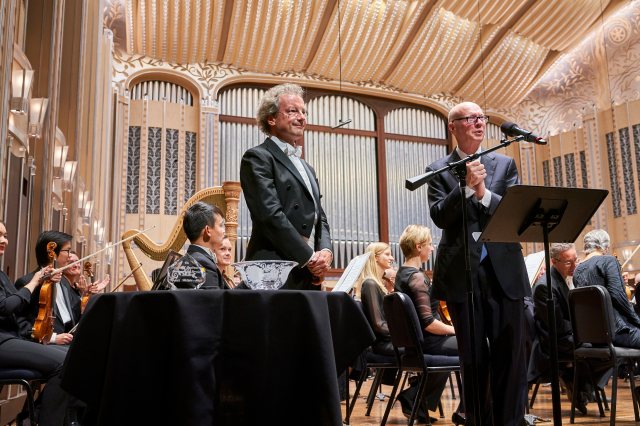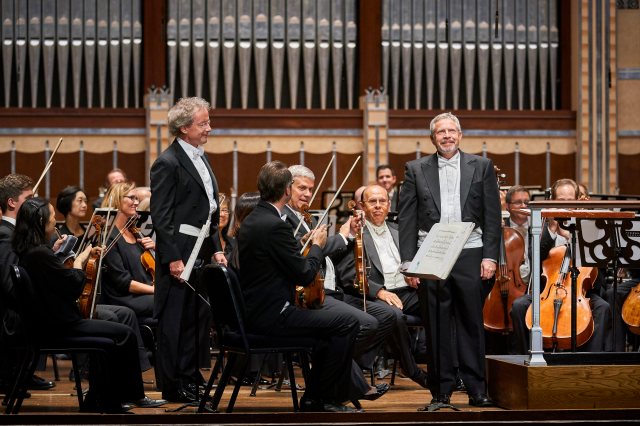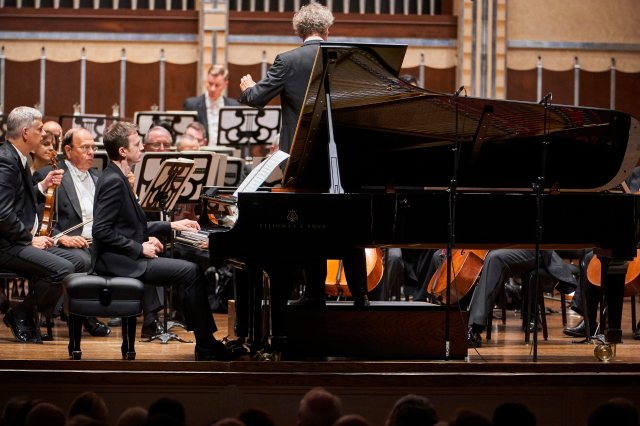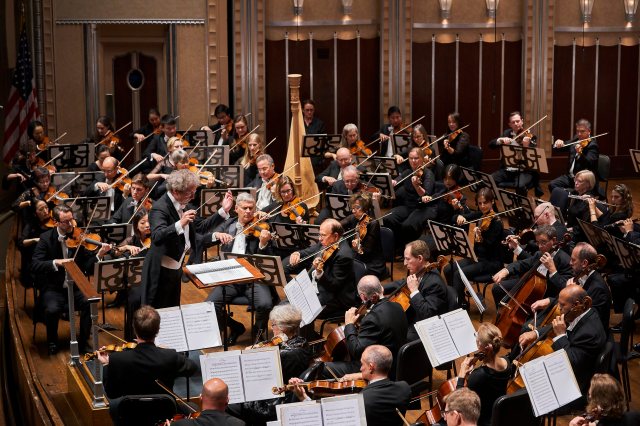Cleveland Orchestra
Franz Welser-Möst, conductor
Alexandre Tharaud, piano
Severance Hall
Cleveland, OH
September 20, 2018
Rathbun: Pantheon
Abrahamsen: Left, alone
Tchaikovsky: Suite from Swan Lake, Op. 20
Encore:
Tchaikovsky: Marche slave, Op. 31
After a momentous centennial season, Franz Welser-Möst and his Cleveland Orchestra are back down to business, opening their second century with a challenging program emblematic of this orchestra’s remarkable ambition. Instead of beginning the season with tried-and-true warhorses as some orchestras might do, the first half was comprised of a world premiere and a US premiere, and even the more populist second half – Tchaikovsky’s Swan Lake – was a welcome alternative to the composer’s evergreen symphonies.

The inaugural work of the season came from the orchestra’s own ranks, assistant principal oboe Jeffrey Rathbun, an accomplished composer in his own right with this being the fourth occasion on which TCO has performed a work of his. Rathbun is certainly a man who knows this orchestra well having been a member for 28 years, and the aptly named Pantheon was a lovely tribute to his colleagues. The work began in the rumbling timpani, with fragments quickly coalescing into a vigorous drive. A more relaxed B section followed, generally tonal and quasi-Romantic, as well as being a veritable “concerto for orchestra” featuring solos from nearly every instrument, showcasing the beauty and power of The Cleveland Orchestra. A dulcet passage from concertmaster Peter Otto was a highlight, but unsurprisingly, the most extensive solo went to the oboe – although Rathbun opted to experience the work from the audience, giving the solo to double-reed colleague Frank Rosenwein.

In the spirit of contemporary music, this weekend’s concerts were dedicated to the memory of Oliver Knussen, a major force with deep ties to Cleveland. Matters continued apace with the first American performance of Left, alone (written 2014-15) by leading Danish composer Hans Abrahamsen. Abrahamsen is a composer quite familiar to this orchestra; its performances of his song cycle let me tell you were given at both Severance Hall and Carnegie Hall to widespread critical acclaim in 2016. As the title cleverly suggests, Left, alone is a piano concerto for the left hand alone, in the spirit of Ravel’s which was memorably performed last February (perhaps a future season could include a survey of left hand piano concertos?). Making his Cleveland Orchestra debut was the work’s dedicatee, French pianist Alexandre Tharaud.
The notion of a work for the left hand alone is one of deep personal significance to Abrahamsen who himself was born with a palsy that impaired use of his right hand. Left, alone is conceived in two parts, each further divided into three interconnected sections. It opened percussively with the center of gravity in the piano’s bottom register, incessant in its rhythmic complexities. In addition to Tharaud’s solo line, there was scoring for an orchestral piano (two hands), played by Joela Jones in counterpoint with Tharaud to yield an intriguing spatial effect. The following section was markedly slower, almost impressionistic – more suggested than executed – while the movement’s conclusion was of greater motion.
The latter half opened with a very brief statement in the solo piano with a touch of trumpet, nearly suspended in time, while matters became wild and unrelenting in the ensuing section, more than living up to its designation of Prestissimo tempestuoso. The final section was the most extended, first invoking again the suspended atmosphere by way of a repeated gesture. At one point Tharaud was instructed to pluck the piano’s strings, illustrative of the concerto’s diverse palette of timbre. The texture became more animated and virtuosic until its perplexingly abrupt ending, as if being cut off in mid-sentence. A work that surely deserves a second hearing, and one couldn’t imagine a stronger advocate than Tharaud who has certainly earned an invitation back to Severance Hall.

Following intermission was the presentation of the Distinguished Service Award which this year went to none other than Welser-Möst. In his heartfelt remarks, the conductor reminded the audience of music’s essential value, deeming it “nutrition for our souls.” A 40-minute suite from Swan Lake concluded, with various selections from the complete ballet culled by Welser-Möst. The overture began with doleful solos from Rosenwein and clarinetist Afendi Yusuf, while the waltz demonstrated the composer’s early gift for the dance form which would be used to such great effect in his later symphonies and ballets, its graceful themes burgeoning into a boisterous affair. Scene (No. 10) was marked by a plaintive oboe solo, showing beauty in tragedy. “Dance of the Swans” was appropriately featherlight, while “Odette and the Prince” featured a lively dialogue between the harp, violin, and cello. A series of four national dances followed with an especially ebullient csárdás, and the final scene was given with a searing passion towards its tragic end.
Continuing the celebratory spirit of opening weekend, an encore was presented, namely the same composer’s Marche slave. A sinuous, fluid melody was quintessentially Tchaikovskyian in this energetic workout of a brilliant showpiece.

